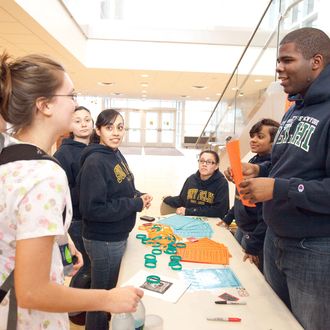
Breakin’ up, as Neil Sedaka famously noted, is hard to do. And when breakups are messy, they often bring out the worst in people. Over the past few years, SUNY Delhi has observed an uptick in Title IX reports dealing with post-breakup harassment. In response to this, the university recently introduced a bystander intervention program, BroncoCHECK, that includes a curriculum on healthy breakups. (A bystander intervention program, in short, trains people to step in and respond to potentially risky situations that don’t directly affect them.)
Counseling staff, in partnership with the university’s peer educator program, developed the training to remind students of what a healthy relationship looks like, one that doesn’t involve aggression or hanging on past an expiration date. The bystander intervention program was implemented this year with freshmen during orientation, and workshops concerning healthy breakups will continue to be offered throughout the year.
“We felt we needed more of a focus specifically on how to end a relationship because people need to know a fair amount about the importance of communication and mutual respect,” said Lori Osterhoudt, the campus director of counseling and health services.
Science of Us spoke to Osterhoudt about what the breakup training will teach students and how the BroncoCHECK program fits in with the national discussion about campus sex crimes.
Before we get into the specifics of teaching kids how to break up better, what are the basics of how bystander intervention training works? What kinds of situations are kids encouraged to step in to stop, and how?
Anything that has the potential to be problematic or unsafe … alcohol poisoning, fighting, potential sexual assault situations, relationship abuse, cheating. The beauty of it is its simplicity and applicability to so many potential situations. We have students who have already been “BroncoCHECK-ing” each other … when someone says something sexist or inappropriate, at parties when they see a friend has had too much to drink.
We tell them not to put themselves in any danger, of course, but if they see something, to say or do something. That might mean speaking up; it might mean calling for help. The BroncoCHECK program that all the new students attended included skits by our orientation leaders that modeled scenarios and how they could specifically handle different situations. One was hazing-related, one was a sexual assault scenario, another related to alcohol poisoning.
As a kid I was always taught to use “I” statements instead of taking a confrontational “You did this, you did that” approach. What kinds of communication insights do you hope to teach students as part of these breakup trainings?
Obviously doing it in person is better than via text or email. And that could be hard, maybe even harder today than it used to be. Being honest and tactful, using “I” statements, as you mentioned, is really important. Don’t lie — tell the truth about why the relationship is over. Another thing I’ve seen come up again and again is “When it’s over, it’s over.” Don’t let it linger. Continuing to hang out together only prolongs the hurt.
What do you see as the most effective ways to communicate “This isn’t working” without having the conversation feel like an outright rejection or dismissal?
Trying to let someone down gently and not fully coming clean is another common problem. Don’t say, “I just need to find myself. I need some space for a while.” Even though they’re trying to let you down gently, it’s not really kind to do it that way. Another thing has to do with social media. Don’t change your status to “single” right away. Does it have to be such a public thing? And spreading rumors about your ex: not cool. A lot of things are … I don’t want to say common sense, because that seems condescending. But they are.
What are ways you are recommending that people stand on their own and reshape their life and their identity after being broken up with?
For one thing, don’t jump into something else too quickly. I usually advise people to find your really positive friends and family and other supportive people in your life because they can help you move on with your life. And that’s where it’s dangerous to get caught up in too much gossip or being around negative people who just want to talk about your ex. I always encourage students to find positive, forward-focused people and to take time for yourself, because you learn something in every relationship, even the ones that don’t work out.
And it’s good to have some time to reflect about that. Like, “What did you learn from this?” “What would you want to do differently in the next relationship?” Relationships start and end every day, and most people will heal, and you have to give it some time. I encourage people to take up a hobby, exercise, find things to do, keep busy. I think journaling is a great way to reflect.
This interview has been edited and condensed.




